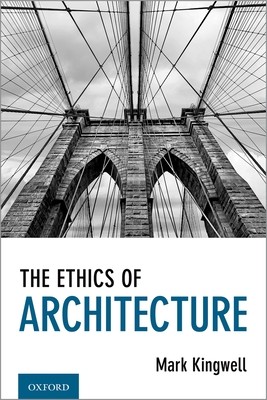
- We will send in 10–14 business days.
- Author: Mark Kingwell
- Publisher: Oxford University Press, USA
- ISBN-10: 0197558542
- ISBN-13: 9780197558546
- Format: 14.5 x 21.1 x 2 cm, hardcover
- Language: English
- SAVE -10% with code: EXTRA
Reviews
Description
A lively and accessible discussion of how architecture functions in a complex world of obligation and responsibility, with a preface offering specific discussion of architecture during and after the COVID-19 pandemic.
What are the special ethical obligations assumed by architects? Because their work creates the basic material conditions that make all other human activity possible, architects and their associates in building enjoy vast influence on how we all live, work, play, worship, and think. With this influence comes tremendous, and not always examined, responsibility. This book addresses the range of ethical issues that architects face, with a broad understanding of ethics. Beyond strictly professional duties - transparency, technical competence, fair trading - lie more profound issues that move into aesthetic, political, and existential realms. Does an architect have a duty to create art, if not always beautiful art? Should an architect feel obliged to serve a community and not just a client? Is justice a possible orientation for architectural practice? Is there such a thing as feeling compelled to "shelter being" in architectural work? By taking these usually abstract questions into theregion of physical creation, the book attempts a reformulation of "architectural ethics" as a matter of deep reflection on the architect's role as both citizen and caretaker. Thinkers and makers discussed include Le Corbusier, Martin Heidegger, Lewis Mumford, Rem Koolhaas, Jane Jacobs, Arthur Danto, and John Rawls.
EXTRA 10 % discount with code: EXTRA
The promotion ends in 20d.19:52:00
The discount code is valid when purchasing from 10 €. Discounts do not stack.
- Author: Mark Kingwell
- Publisher: Oxford University Press, USA
- ISBN-10: 0197558542
- ISBN-13: 9780197558546
- Format: 14.5 x 21.1 x 2 cm, hardcover
- Language: English English
A lively and accessible discussion of how architecture functions in a complex world of obligation and responsibility, with a preface offering specific discussion of architecture during and after the COVID-19 pandemic.
What are the special ethical obligations assumed by architects? Because their work creates the basic material conditions that make all other human activity possible, architects and their associates in building enjoy vast influence on how we all live, work, play, worship, and think. With this influence comes tremendous, and not always examined, responsibility. This book addresses the range of ethical issues that architects face, with a broad understanding of ethics. Beyond strictly professional duties - transparency, technical competence, fair trading - lie more profound issues that move into aesthetic, political, and existential realms. Does an architect have a duty to create art, if not always beautiful art? Should an architect feel obliged to serve a community and not just a client? Is justice a possible orientation for architectural practice? Is there such a thing as feeling compelled to "shelter being" in architectural work? By taking these usually abstract questions into theregion of physical creation, the book attempts a reformulation of "architectural ethics" as a matter of deep reflection on the architect's role as both citizen and caretaker. Thinkers and makers discussed include Le Corbusier, Martin Heidegger, Lewis Mumford, Rem Koolhaas, Jane Jacobs, Arthur Danto, and John Rawls.


Reviews